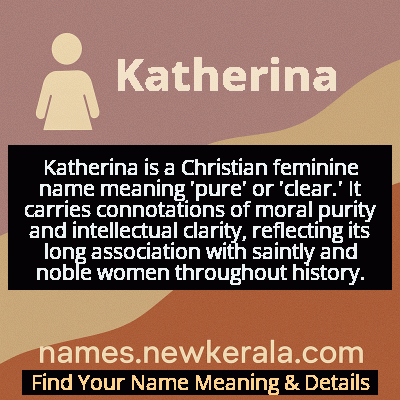Katherina Name Meaning & Details
Origin, Popularity, Numerology Analysis & Name Meaning of Katherina
Discover the origin, meaning, and cultural significance of the name KATHERINA. Delve into its historical roots and explore the lasting impact it has had on communities and traditions.
Name
Katherina
Gender
Female
Origin
Christian
Lucky Number
6
Meaning of the Name - Katherina
Katherina is a Christian feminine name meaning 'pure' or 'clear.' It carries connotations of moral purity and intellectual clarity, reflecting its long association with saintly and noble women throughout history.
Katherina - Complete Numerology Analysis
Your Numerology Number
Based on Pythagorean Numerology System
Ruling Planet
Venus
Positive Nature
Harmonious, responsible, caring, and artistic.
Negative Traits
Overly idealistic, superficial, possessive, or jealous.
Lucky Colours
Pink, turquoise.
Lucky Days
Friday.
Lucky Stones
Diamond, turquoise.
Harmony Numbers
2, 3, 9.
Best Suited Professions
Artists, musicians, teachers, healthcare workers.
What People Like About You
Warmth, nurturing nature, artistic flair.
Famous People Named Katherina
Katherina of Aragon
Queen of England
First wife of King Henry VIII and mother of Queen Mary I
Katherina Graham
Publisher
Publisher of The Washington Post during the Watergate scandal
Katherina Witt
Figure Skater
Two-time Olympic gold medalist and four-time World Champion
Katherina Heise
Artist
German expressionist painter and graphic artist
Name Variations & International Equivalents
Click on blue names to explore their detailed meanings. Gray names with will be available soon.
Cultural & Historical Significance
The name's cultural impact expanded through royal patronage, most notably with Catherine of Aragon (originally Catalina in Spanish), whose marriage to King Henry VIII of England placed the name at the center of European politics and the English Reformation. In literature, Shakespeare's 'The Taming of the Shrew' immortalized the character Katherina Minola, adding layers of cultural meaning around strong-willed femininity and intelligence. The name's persistence across centuries and cultures—from Russian tsarinas to German nobility—demonstrates its enduring appeal and adaptability while maintaining its core associations with purity, wisdom, and strength.
Extended Personality Analysis
Women named Katherina are typically associated with a distinctive blend of intelligence, strength, and moral clarity. They often possess a natural authority and confidence that commands respect, combined with sharp analytical abilities that make them excellent problem-solvers. The name suggests someone who is both principled and practical—able to maintain strong ethical standards while navigating complex situations with wisdom and grace. Katherinas are frequently perceived as having depth of character, with a thoughtful nature that values substance over superficiality.
In interpersonal relationships, Katherinas are known for their loyalty and reliability, though they may initially present as reserved or discerning in forming new connections. Their strength of character often manifests as resilience in facing challenges and the courage to stand by their convictions. While they can be strong-willed and determined, this is typically balanced by a sense of fairness and compassion. The combination of intellectual prowess and moral integrity makes Katherinas natural leaders who inspire trust and admiration in both personal and professional contexts. Their personality reflects the name's historical bearers—women of substance who leave lasting impressions through their wisdom and strength of character.
Modern Usage & Popularity
In contemporary naming practices, Katherina maintains a position as a classic yet distinctive choice that appeals to parents seeking traditional roots with European sophistication. While it doesn't rank among the most popular names in English-speaking countries, it enjoys consistent usage particularly among families with German, Austrian, or Eastern European heritage where the 'K' spelling is more traditional. The name's modern appeal lies in its elegant sound and historical depth, offering a more distinctive alternative to the more common 'Katherine' or 'Catherine.' Current naming trends show Katherina being chosen by parents who value timeless elegance over fleeting popularity, often appearing in educated, cosmopolitan circles where its international flair is appreciated. Its usage remains stable rather than trendy, ensuring it maintains its classic status without becoming overused or dated.
Symbolic & Spiritual Meanings
Symbolically, Katherina embodies the powerful combination of purity and strength, representing both moral clarity and intellectual fortitude. The name carries connotations of refined wisdom—not just knowledge, but the discernment to apply it with integrity and purpose. It symbolizes the enduring quality of truth and principle, much like the saintly figures who bore the name throughout history. Metaphorically, Katherina suggests a person who serves as a moral compass, maintaining clarity of purpose even in challenging circumstances. The name also represents the synthesis of traditional values with independent thinking, embodying the strength to uphold one's convictions while remaining open to growth and understanding. In its fullest symbolic expression, Katherina represents the ideal of enlightened leadership—combining intelligence, principle, and the courage to act according to one's beliefs.

